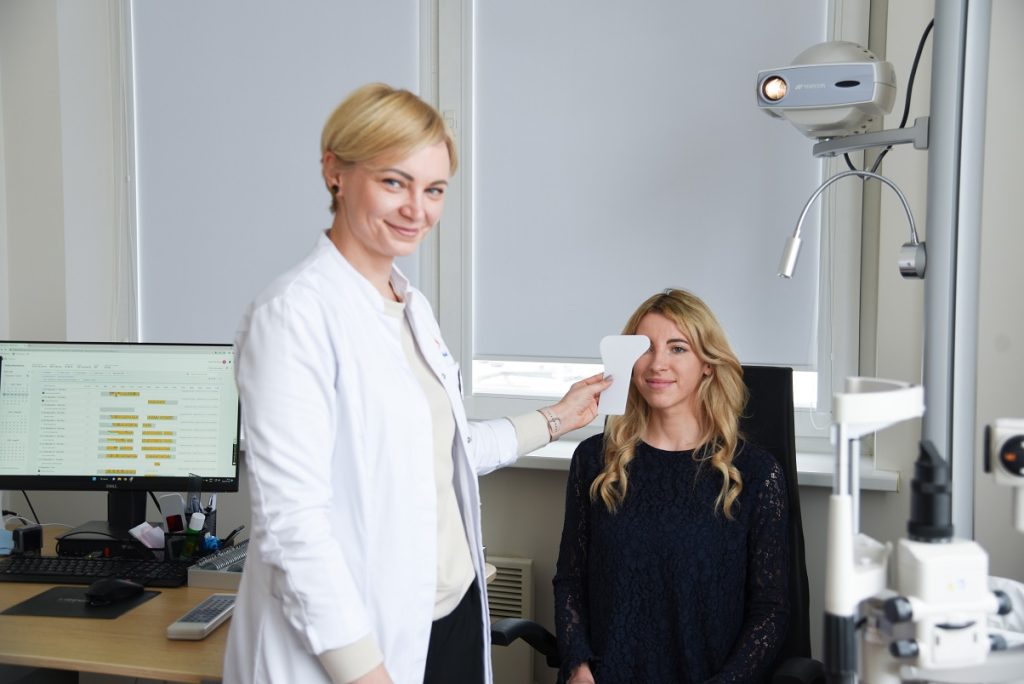The number of patients complaining of poor eyesight is increasing, and with the start of the working season, when everyone rushes to school, activities, and spends more time indoors with smart devices, the workload on the eyes increases even more.
According to Rasa Palevičienė, an optometrist at the “Lirema” Eye Clinic, the number of young patients whose vision is impaired due to myopia is increasing in particular. In addition, the increasing life expectancy of people has the effect that the ranks of elderly patients with cataracts are also increasing.
“It’s good that most people go to the doctor on time, so cataracts are not neglected, but there are those who are late, so it is more difficult for surgeons to save their vision,” the specialist shares her experience.
Myopia boom
According to R. Palevičienė, vision disorders can occur at any age.
“Unfortunately, the number of children developing myopia is increasing. The World Health Organization predicts that in 2050, every second person in the world will be short-sighted,” says the optometrist.
Using computers, phones, and other intense close-up viewing stimulates the growth of children’s eyeballs, leading to the development of nearsightedness.
“We forget to rest our eyes, go outside, spend too little time in natural daylight. It should be emphasized that it is not the smart devices themselves that become the enemy of the eyes, but the long, uninterrupted work of the eyes at the same distance encourages the appearance and progression of myopia”, reminds R. Palevičienė.
According to her, it is very important to notice children’s vision problems in time and correct them appropriately. Without correcting the vision, myopia tends to progress more quickly, and other complaints may appear, such as headaches, postural problems due to the need to bend closer to an object that is difficult to see, etc.
“It is also important for elderly patients to regularly check their vision because changes in it can signal certain diseases, such as cataracts or macular degeneration,” warns R. Palevičienė.
The reasons are complex
Myopia usually begins to develop in childhood or adolescence, but there are cases where vision deteriorates in the late twenties.
“If one of the parents is myopic, the child also inherits the tendency to develop a vision defect. However, myopia does not necessarily develop due to a genetic predisposition now, there are more children whose eyesight is deteriorating, even though their parents are sighted,” clarifies R. Palevičienė.
Myopia develops gradually. The rate of progression depends on the age of the patient, the correction used, and the workload at close range.
“There is really no need to be afraid after hearing the diagnosis of myopia. It is important to solve the problem in time and correct the vision. Contact lenses or glasses can be chosen for this. And in order to achieve complete freedom, adult patients can choose laser vision correction,” emphasizes the specialist.
It’s not the computer’s fault
Many people work in front of screens and complain about eye strain. Computers nowadays are modern and safe devices, and it is not the computer or tablet itself that causes eye strain but constant, uninterrupted close-up viewing.
“The human eye rests only when it looks into the distance. Seeing closer than 60 cm is a huge work for the eyes because they have to increase their refractive power (accommodate). Therefore, it is natural that the longer we look at the screen without looking back, the more we feel eye fatigue,” says R. Palevičienė.
According to an optometrist, we tend to blink less when looking at screens, which makes our eyes drier. When working in front of screens, it is very important to take breaks and let your eyes look in the distance, and if your eyes feel dry, use moisturizing drops.
In addition to the aforementioned fatigue and dry eyes, screens can disturb a person’s sleep. Scientists have found that the blue light emitted by screens inhibits the production of the sleep hormone – melatonin. Melatonin is vital for regulating nighttime sleep cycles, so it may be harder for someone who watches screens before bed to fall asleep.
“I want to emphasize that blue light is not dangerous, because it is part of the daylight spectrum, and it is not necessary to be protected from it. However, 2 hours before bedtime, it is recommended to avoid screens (including TV) in order to improve the quality of sleep,” advises R. Palevičienė.
Effective exercises
Whether a person uses a computer or otherwise spends a lot of time working at the same distance, three simple but effective exercises can be recommended to help the eyes rest:
- Close your eyes 10 times. Squeeze the eyelids very tightly.
- Move the focus from a closer to a further object. First 10 sec. look at the end of the pen, then move your gaze to the farthest object you can find, look at it for another 10 seconds, and then return to the first one. Repeat the exercise 10 times.
- Turn your eyes around your axis: first, look up as much as you can and feel that the eyeball is being stretched. Turn your eyes diagonally, to the right, to the left, down.
- Remember that everything is necessary in moderation, so spend more time outside during the daylight hours, protect the general health of the body and eat healthier.
